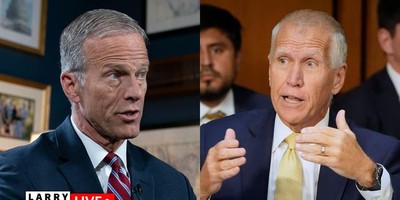Many analysts considered the victor, Democrat Kathy Hochul, a better candidate than Republican Jane Corwin. Hochul had a longer track record in the district and more connection with voters. Plus, a third-party candidate -- former Democrat and faux tea party representative Jack Davis -- spent millions on his campaign and pulled 9 percent of the vote. But excuses notwithstanding, Republicans should learn a few lessons from their loss.
First, entitlement reform is necessary but politically risky. For years, Social Security and Medicare reform have been the third rail of American politics. Democrats have never once resisted the temptation to demagogue the issue for electoral advantage, and this political season is no different. Democrat campaign commercials showing a Rep. Paul Ryan look-alike dumping grandma over the cliff in her wheelchair show the depths Democrats are willing to stoop in order to scare the elderly into voting against Republicans. The ad would be laughable if it weren't so dangerous.
Agree or disagree with Ryan's proposed deficit reduction plan that would create a new way to provide medical care for the elderly, at least he's offered a real plan, which is more than you can say for the Democrats. Even former President Bill Clinton warned Democrats "not to tippy-toe around" dealing with Medicare, noting "We've got to deal with these things."
Yet, this week, the Democratic leadership in the Senate forced a vote on the Ryan plan -- which lost -- but then offered no plan of their own. This should come as no surprise since the Democrats couldn't manage to pass a budget last year when they controlled both houses of Congress and the White House.
Recommended
Second, most voters favor cutting government spending -- but only on programs that don't actually affect them. Lots of people believe we can actually solve our problems simply by cutting waste, fraud, and abuse in government programs and ending or reducing foreign aid, which would hardly make a dent in the deficit. And polls consistently show that Americans are against government cuts to education (even though there is little evidence that more money produces higher education achievement), defense, homeland security, border protection or poverty programs, much less Social Security or Medicare. Yet these are the big-money items.
The American middle class has become increasingly dependent on government programs, from guaranteed student loans for the young to income and medical support for the elderly. But few people are willing to pay for the benefits they receive. According to a study by the Brookings Institution, the average male Social Security recipient receives an average 21 percent more in benefits than he (and his employers) paid into the system in taxes.
Medicare recipients receive an even higher ratio of benefit to taxes paid in. The National Bipartisan Commission on the Future of Medicare estimated that by 2016, the average male would receive about 160 percent in benefits from what he and his employer paid in taxes, and the average female an even higher percentage. And an estimated 25 percent of Medicare expenditures go for care in the last year of life, a figure that has remained steady over the last several decades.
Third, politicians will never become accountable so long as voters believe they are actually "entitled" to any government programs. The whole debate over "entitlements" suggests a right that simply doesn't exist. The guarantees in our Constitution have mainly to do with individuals' civil and political rights -- such as the right to equal protection of the laws -- not with promises of specific government programs. Article I gives Congress the power to "provide for the common defense and the general welfare of the United States," but there is no inherent right to a specific level of defense spending or entitlement to government assistance. The people can receive only what they are willing collectively to pay for, which is what elections are all about.
In a democracy, the people generally get the government they deserve. If Americans are serious about reducing our national debt, we'll elect officials who are willing to make hard -- even unpopular -- choices. If not, we'll continue to mount up bills and we'll have no one to blame but ourselves. In the end, it won't be the Republican Party that loses, but America.

























Join the conversation as a VIP Member